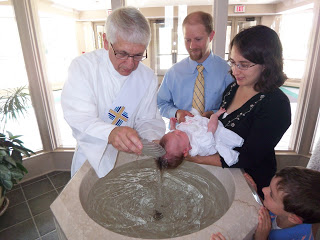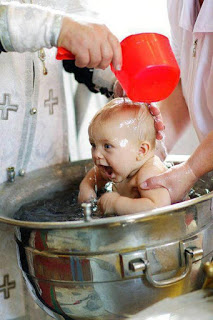scriptural justification” some time ago, I kindly request you help me repost it
so as to refer it to a friend. Thank you”
INFANT BAPTISM AND ITS SCRIPTURAL
JUSTIFICATION
Catholic Church is the issue of infant baptism. They tend to cite numerous
texts averring to the fact that only adults must be baptized. I also see this
as a case of ignorance; if only they had read the scriptures properly, they
would have been clarified and refrain from their criticisms. This post aims at clarifying and justifying with biblical examples the practice of infant
baptism, beginning from the Old Testament through the New Testament (the record
of infant baptism in the Acts of the Apostles); drawing a parallelism between Baptism
and Circumcision, and equally treats the objection of the fundamentalists as to
whether baptism is necessary for salvation. Please kindly take your time and
read along.
covenant was sealed with the sign of CIRCUMCISION in Genesis 17. God promised
to bless Abraham. For Abraham this meant two things in particular, offspring
and land. But at the heart of the covenant was God’s promise that he would be a
God to Abraham and his children (Gen. 17:7, 8). Circumcision was not just a
physical thing, marking out ethnic Jews. Circumcision was full of spiritual
meaning. The circumcision of the flesh was always meant to correspond with
circumcision of the heart (Rom. 2:25-29). It pointed to humility, new birth,
and a new way of life (Lev. 26:40-42; Deut. 10:16; 30:6; Jer. 4:4; 6:10; 9:25).
In short, circumcision was a sign of justification. Paul says in Romans 4:11
that Abraham “received the sign of circumcision as a seal of the righteousness
that he had by faith while he was still uncircumcised.” God’s own
interpretation of circumcision is that it was much more than just a physical
sign for national Israel.
Abraham. Paul makes clear in Galatians 3 what Peter strongly suggests in Acts 2,
namely that the Abrahamic covenant has not been annulled. It is still
operational. In fact, we see the basic promise of the Abrahamic covenant
running throughout the whole Bible, right up to the new heaven and new earth in
Revelation 21.
As the Jews practiced proselyte baptism, that sign came to be seen as marking
inclusion in the covenant people. For a while circumcision existed along
baptism, but as the early church became more Gentile, many of Jewish rites were
rendered unnecessary, and sometimes even detrimental to the faith. Thus,
baptism eclipsed circumcision as the sign renewal, rebirth, and covenant
membership.
Excluding children from baptism implies going against the sayings of Christ
himself: “Let the little children come to me, and do not hinder them, for
the kingdom of heaven belongs to such as these.” (Matt. 19:14). And we
were meant to understand that the sacrament of baptism commences the rite of
Christian initiation. Put differently, by baptism, we are incorporated into the
mystical body of Christ (the Church); thus, we become children of God and
members of the Church. Besides, the psalmist also says:”O see, in guilt I was
born, a sinner was I conceived…” (Ps. 51:5). This is the justification that everyone
(even infants) was conceived and born in “Original Sin” (the sin we
inherited from Adam and Eve), thus, the Sacrament of Baptism sets out to
cleanse us from this sin. (An exception to the Original Sin is Christ and His
Blessed Mother Mary; this I would explain in another post). This is why Christ
made baptism a mandatory one for everybody; a prerequisite for salvation; he
says: “I tell you most solemnly, unless one is born of water and the Holy Spirit,
he cannot enter the kingdom of God…” (John 3:5). With this, Christ is offering
each and every one of us the opportunity to be saved by baptism; and a better
opportunity for children, because the kingdom of Heaven is meant for people of
their kind; little wonder he tells us not to keep them off from him; that is,
they ought to be initiated into His mystical body (the Church), and Baptism is
the sacrament responsible for this.
Christians understood this command of Christ, and they baptized Children during
their ministry. Let us confirm from the Scripture.
The emphasis on “household” or “family” points to a continuity between the Old
Covenant corporate view-point and that of the New covenant. Children are viewed
as being part of a covenant household, a covenantal unit. The sign, in Scripture,
is applied to the whole household unit. Scripture uses this household formula
in several clear passages which show a great deal of unity between old covenant
practice and New Covenant (baptismal) practice. We know that when Luke wrote
Acts he was selective in his reporting. So it is important to note that
proportionally, when we compare the number of household baptisms to other
baptisms in Acts, household baptisms are common. In Acts, as with circumcision
in the old covenant, baptism is a household affair and the household texts
prove it.
and the members of her household were baptized.” It cannot be argued reasonably
that there were no children in this “household.” (Cf. Acts 16:11ff). As in this
case of Lydia, Luke communicated the covenantal nature of baptism through the
use of the oikos (household formula).
was saved… He and his whole family. (Acts 16: 33,34).
“next door” to the house of Titius Justus, another “God-fearing” Gentile. There
“Crispus, the synagogue ruler, and his entire household believed in the Lord;
and many of the Corinthians who heard him believed and were baptized” (Acts
18:8).
2000 years: The adult Gentile converts were circumcised along with their male
children in accordance with Genesis 17:10-14. Certainly those adult converts had
to confess their faith. Both believing adults and their children are described
by the word “household.”
richness of Infant baptism and baptism as a whole, then the will of God would
reign on earth (For it is His will that all men be saved and come to the
knowledge of the Truth… 1 Timothy 2:4)
fundamentalists
should confess our sins and accept Jesus as our personal Lord and saviour.
Children are very little to understand all these”
We Catholics believe that is necessary, but there is more to it than that. In
addition to believing and confessing with our lips, we need to be baptized.
share in the death and new life of Christ: It is through baptism.” The
beginning of Romans 6 says, “Don’t you know that all of us who were
baptized into Christ Jesus were baptized into his death? We were therefore
buried with him through baptism into death in order that, just as Christ was
raised from the dead through the glory of the Father, we too may live a new
life.” This idea that we are made one with Christ through baptism is
reiterated by Paul in Colossians 2:12, and in Galatians 3:27 he likens baptism
to “being clothed with Christ.”
necessity of baptism is in John’s Gospel. When Nicodemus comes to visit Jesus
by night, Jesus says that a person cannot enter the kingdom of God without
being born again. Nicodemus asks how a man might enter again into his mother’s
womb and Jesus corrects him, saying, “No one can enter the kingdom of
heaven unless he is born of water and the Spirit” (John 3:3-5). From the
earliest days of the Church this passage has been understood to refer to
baptism.
confess with your mouth, ‘Jesus is Lord,’ and believe in your heart that God
raised him from the dead, you will be saved. For it is with your heart that you
believe and are justified, and it is with your mouth that you confess and are
saved.”
of faith are necessary, but the whole witness of the New Testament shows us
that BAPTISM IS NECESSARY AS WELL.
The jailer cries out, “What must I do to be saved?” and Paul and
Silas reply, “Believe in the Lord Jesus Christ and you will be saved—you
and your household” (Acts 16:31). It seems there is no demand for baptism.
However, actions speak louder than words because verse 33 says that
“IMMEDIATELY THEY WERE BAPTIZED.” Baptism therefore is the way one
makes the faith commitment.
faith is accompanied by baptism, and it is assumed that both are necessary. Two
other clear accounts are Philip’s encounter with the Ethiopian eunuch in Acts
8, and Peter’s immediate baptism of Cornelius and his household in Acts 10. The
pattern in Acts is consistent: preaching, repentance of the hearers, belief in
Christ, and immediate baptism. Why would this be the case if the apostles did
not believe that baptism was both effective and necessary for salvation?
“REPENT, AND BE BAPTIZED every one of you in the name of Jesus Christ for
the forgiveness of your sins; and you shall receive the gift of the Holy
Spirit” (Acts 2:38). But he did not restrict this teaching to adults. He
added, “For the promise is to you and to your children and to all that are
far off, every one whom the Lord our God calls to him” (2:39). We also
read: “RISE AND BE BAPTIZED, and wash away your sins, calling on his
name” (Acts 22:16). These commands are universal, not restricted to
adults. Further, these commands make clear the necessary connection between
baptism and salvation, a connection explicitly stated in 1 Peter 3:21: “BAPTISM
. . . NOW SAVES YOU, not as a removal of dirt from the body but as an appeal to
God for a clear conscience, through the resurrection of Jesus Christ.” ……
Let us consider once again the very words of our Master, Jesus Christ: “Let the
little Children come to me and do not hinder them; for to such belongs the
kingdom of heaven” (Matt. 19:14). More detail is given in Luke’s account
of this event, which reads: “Now they were bringing even infants to him
that he might touch them; and when the disciples saw it, they rebuked them. But
Jesus called them to him, saying, ‘Let the children come to me, and do not
hinder them; for to such belongs the kingdom of God’” (Luke 18:15–16). But
the text in Luke 18:15 says, “Now they were bringing even infants to
him” (Greek, Prosepheron de auto kai ta brepha). The Greek word brepha means
“INFANTS”—children who are quite unable to approach Christ on their
own and who could not possibly make a conscious decision to “accept Jesus
as their personal Lord and Saviour.” And that is precisely the problem.
Fundamentalists refuse to permit the baptism of infants and young children,
because they are not yet capable of making such a conscious act. But notice
what Jesus said: “to such as these (referring to the infants and children
who had been brought to him by their mothers) belongs the kingdom of heaven.”
The Lord did not require them to make a conscious decision. He says that they
are precisely the kind of people who can come to him and receive the kingdom.
Now juxtapose with what Christ said to Nicodemus “No one can enter the
kingdom of heaven unless he is born of water and the Spirit” (John 3:3-5).
If this statement of Christ is focused to ALL, then we should NOT prevent the
children from being baptized, because everyone is born in SIN (just as the
psalmist says: “For in Sin I was born, a sinner was I conceived…” Ps. 51. This
kind of sin is called original sin which inherited by all) Hence, the best way
to bring the Children to Christ is to first get rid of their sins (original
sin); because to them belong the kingdom of heaven. Hence, since they cannot
profess Christ and believe in Him consciously, it is the duty of their parents
and god-parents to raise them up in the Christian way of life so that they
would come to a proper understanding of this. So if Jesus said “let them
come unto me,” who are we to say “no,” and withhold baptism from
them?
Furthermore, if you followed the analogy I made vis-à-vis circumcision, then
you would understand what Paul meant when he noted that baptism has replaced
circumcision (Col. 2:11–12). In that passage, he refers to baptism as “the
circumcision of Christ” and “the circumcision made without
hands.” Of course, usually only infants were circumcised under the Old
Law; circumcision of adults was rare, since there were few converts to Judaism.
If Paul meant to exclude infants, he WOULD NOT have chosen circumcision as a
parallel for baptism.
God of Israel and be circumcised. In the New Testament, if one wants to become
a Christian, one must believe in God and Jesus and be baptized. In the Old
Testament, those born into Jewish households could be circumcised in
anticipation of the Jewish faith in which they would be raised. Thus in the New
Testament, those born in Christian households can be baptized in anticipation
of the Christian faith in which they will be raised. The pattern is the same:
If one is an adult, one must have faith before receiving the rite of
membership; if one is a child too young to have faith, one may be given the
rite of membership in the knowledge that one will be raised in the faith by his
parents and god-parents. This is the basis of Paul’s reference to baptism as
“the circumcision of Christ”—that is, the Christian equivalent of
circumcision.
(CLICK TO READ: “BUT THE BIBLE MAKES REFERENCE OF JESUS TALKING ABOUT ELIJAH RETURNING IN THE FORM OF JOHN THE BAPTIST; IS THIS NOT A SUPPORT FOR REINCARNATION?”)





